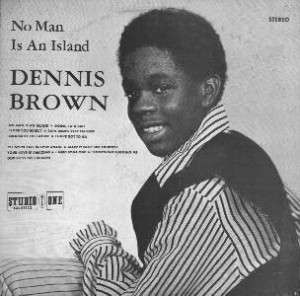Dennis Emmanuel Brown was a Jamaican singer and songwriter born in Kingston on (February 1, 1957 – July 1, 1999).
Early Years
In 1968 during the dawn of the Reggae era Dennis Brown made his first appearance as a professional singer at the age of 11. He debuted as a guest performer at a local club in Kingston with the club’s resident group, the Fabulous Falcons. As a result of his spectacular performance he was invited to join the group as a lead vocalist.
His talent was later discovered by Byron Lee, lead singer of Byron Lee and the Dragonaires and was booked to perform as “Boy Wonder” at a show which featured American artists.
Brown’s first recording was an original song called “Lips of Wine” produced by Derrick Harriot. However the single was not released. The single was again recorded and released in 1972 by Trojan Records.
Studio One
In 1969 he joined Clement Coxsonne Dodd’s Studio One where he released his first single “No Man Is An Island”. The single became a major hit in Jamaica in the late 1970.
At Studio One he recorded several songs and also worked as backing vocalist for artist such as Horace Andy, Larry Marshall and Alton Ellis. His work there formed the compilation for two albums “No Man Is An Island” and “If I Follow My Heart”. Both albums were released after Brown left Studio One in 1971.
Joe Gibbs
In 1972 he recorded the single “Money In My Pocket” which was backed by the Soul Syndicate Band and produced by Winston “Niney” Holness for Joe Gibbs Recording Studio. It became a major success in United Kingdom where it peaked at number. His success with Joe Gibbs followed with hits such as ‘Westbound Train”, “Cassandra” and “No More Will I Roam”.
In 1974 Joe Gibbs released an album called “The Best of Dennis Brown”.
DEB Record Label
In 1975 he recorded the album “Just Dennis” with Trojan Records. Shortly after Trojan Records closed down. Later that year he formed his own record label along with Winston Holness called Dennis Emanuel Brown (DEB) Music. The early DEB recordings included “So Long Rastafari”, “Boasting” and “Open the Gate”.
In 1976 DEB Music secured a deal with the British based Morpheos Records and Ethnic Fight to distribute Brown’s music in UK. The deal ended with very little commercial success.
At the end of 1976 he recorded “Take a Trip to Zion” and “Wolf and Leopard” with producer Lee Scratch Perry’s at Black Ark Studio in Kingston. “Wolf and Leopard” became one of his most popular songs in Jamaica.
In 1977 DEB Music formed a partnership with Joe Gibbs where Brown would record at Gibb’s studio mscwhich would be released on the DEB Music Label while Gibbs would have exclusive rights to the use of the rhythm. Together they produced the albums “Vision of Dennis Brown” (1977) and “Wolf and Leopard” (1978) which featured a reissued version of the Wolf and Leopard single of 1976. Brown also started to produce for a protégé called Junior Delgado.
Migration to London
In 1978 Dennis Brown migrated to London and established a studio for DEB Music. The UK based label produced work by Bob Andy and Gregory Isaacs. Brown released two new albums “So Long Rastafari” and “Joseph’s Coat of Many Colours” before closing down the record label in 1979.
The 1980’s
In 1981 he signed with the UK based A&M records where he released three (3) albums “Foul Play” (1981) which was produced by Joe Gibbs, “Love Has Found Its Way” (1982) and “The Prophet Rides Again” (1983).
Grammy Nomination
He received Grammy nominations for Best Reggae album In 1994 for his album “Light My Fire” and in 2001 for “Let Me Be the One” which was the last album recorded by Brown.
Posthumous Career
In May 1999 while on tour in Brazil he was diagnosed with pneumonia. On June 30 1999 after suffering from cardiac arrest, he was rushed to the University Hospital of the West Indies in Kingston. He died in hospital the next day on July 1, 1999.
In October 2011 the government of Jamaica gave him the national honour of Order of Distinction for his contribution to the development of Jamaican music.



